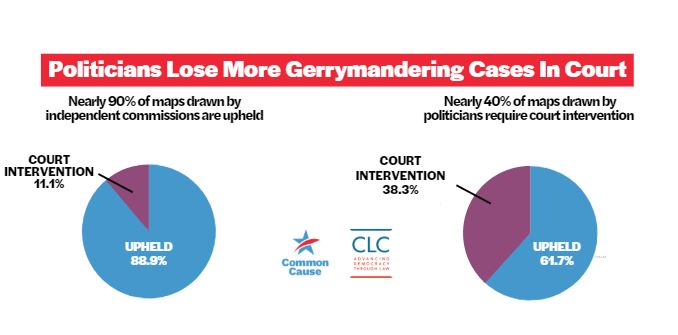Politicians Lose More Gerrymandering Cases: Courts

Maps drawn by politicians are more than three times more likely to require court intervention than those drawn by independent citizen commissions, according to data analysis from Common Cause and the Campaign Legal Center.
Over 38 percent of state and congressional district maps where politicians controlled redistricting in the 2010-cycle were either struck down by courts or drawn by courts when politicians failed to agree on maps. This includes states in which elected officials are in charge of redistricting either through the legislative process or in politician commissions. However, only 11 percent of maps drawn by independent citizen commissions with partisan balance suffered a similar fate. The politician totals include two maps struck down today by a federal Michigan court.
The significant difference shows that politicians are not drawing district lines with people in mind and are wasting taxpayer dollars on losing cases. It also provides evidence that the states that passed reforms last year to remove map-drawing powers from politicians and give it to citizens commissions were on the right track.
“The redistricting process always raises the question of who draws better maps,” said Dan Vicuna, national redistricting manager for Common Cause. “Legislators claim they do, that they know their communities best, but the fact is they are wrong. Politicians’ primary interest in not in fairly representing communities, it is their own re-election and in giving their party an advantage, and that often violates the law.”
The maps that were struck down had all sorts of problems. In Florida, politicians violated a state constitutional prohibition against drawing state and congressional maps with an advantage for a party or candidate. Common Cause helped pass the provision, challenged the maps and prevailed in state court in 2015.
Politicians were found guilty of racial gerrymandering in states like Virginia and Alabama. North Carolina is a particularly bold violator. After maps there were struck down as a racial gerrymander, map-drawers notoriously stated in public that they were drawing new maps to give Republicans a partisan advantage. Common Cause has challenged that map all the way to the U.S. Supreme Court. A decision in Rucho v. Common Cause is expected in June.
There is an alternative to politician-drawn maps. Five states – Arizona, California, Idaho, Montana and Washington – give the power to draw maps to independent citizen commissions with partisan balance. These commissions are considered “independent” because no legislator or governor has any say in the approval of the maps.
“Maps drawn by independent citizen commissions are far more likely to withstand a legal challenge because the people drawing the maps are actually motivated by fairness,” Vicuna said. “They want fair representation. They want to keep communities together. They want citizens’ votes to count.”
Just one map drawn by a balanced independent commission during the 2010-cylce was struck down – in Idaho, a historically one-party state with less than 2 million residents. Map-drawers there were found by a state court found to have split more counties than necessary.
Vicuna attributes the legal issue not to racial or partisan intentions, but a short-coming on the commission’s structure. Idaho allows legislators and political party leaders to directly appoint commissioners without the assistance of a nonpartisan entity to screen candidates. Also, the limited restrictions on who can serve only prohibit individuals who have been a lobbyist in the previous year or those who have been elected officials or candidates in the previous two years.
More states are moving toward citizen commissions and away from partisan map drawers on the belief that voters should choose their politicians, not the other way around. In 2018, the states of Colorado, Michigan, Missouri, Ohio and Utah passed redistricting reforms to dilute the power of politicians to draw districts. Ballot measures to establish citizen commissions are taking shape in Nebraska and Oregon to do the same.
“Courts look kindly on maps drawn by people with fairness in mind, and they strike down egregious maps drawn by politicians that protect their own power,” Vicuna said. “It matters who draws the lines.”